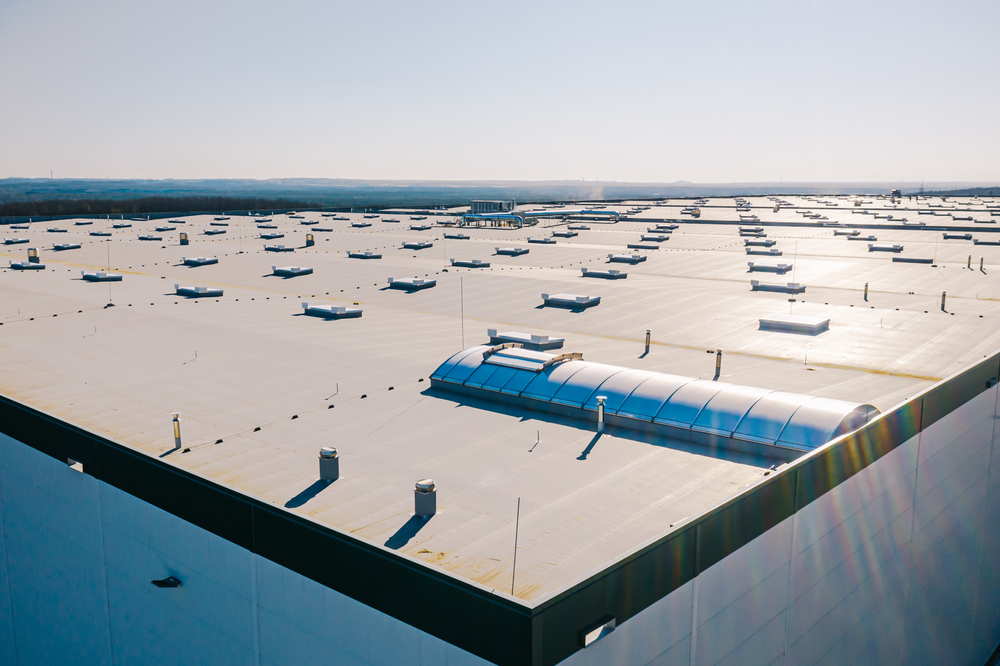Choosing a commercial flat roof for your Greenville, SC, business is an investment in the longevity and safety of your establishment. However, understanding the costs associated with this investment can be a challenge. In this article, we will help you understand the various factors that impact the cost of commercial flat roofing in Greenville, enabling you to make an informed decision.
Different Types of Commercial Flat Roofs
Commercial flat roofs are not a one-size-fits-all solution. There are several types available, each with its own benefits, drawbacks, and costs. Here are a few common types:
Built-Up Roof (BUR)
Built-Up Roof (BUR) is a traditional commercial flat roofing option consisting of layers of felt, tar, and gravel. It is one of the most durable roofing types and can last up to 30 years with proper maintenance. It provides excellent waterproofing, fire resistance, and UV protection. However, it is a heavy and messy installation process, and the gravel can create drainage problems if not installed correctly.
Modified Bitumen
Modified Bitumen is a roofing system that is similar to Built-Up Roofing (BUR) but has additional layers of polymer-modified asphalt. It is easy to install, lightweight, and durable, making it ideal for commercial buildings. It is resistant to weathering, punctures, and tears. However, it is not as fire-resistant as BUR and may require additional fireproofing.
EPDM Rubber Roof
EPDM (ethylene propylene diene monomer) Rubber Roofing is a single-ply roofing membrane that is popular for its durability, flexibility, and ease of installation. It is resistant to UV rays, ozone, and weathering. It can last up to 50 years with proper maintenance. However, it may not be the best option for buildings with high foot traffic, as it is prone to punctures and tears.
TPO & PVC Roof
TPO (thermoplastic olefin) and PVC (polyvinyl chloride) are single-ply roofing membranes that are lightweight, easy to install, and energy-efficient. They are resistant to UV rays, punctures, and tears. They are also reflective, which helps to reduce energy costs by keeping the building cooler. However, they may not be as durable as other roofing types and require frequent maintenance.
Metal Flat Roof
Metal roofing is a popular commercial roofing option due to its durability, energy efficiency, and low maintenance. It is available in various materials, including aluminum, steel, and copper. It is resistant to fire, wind, and pests. It can last up to 50 years or more with proper maintenance. However, it can be costly compared to other roofing types, and it may not be the best option for buildings with high foot traffic, as it can be noisy when it rains or hails.
| Type of Flat Roof | Approximate Cost per Square Foot |
|---|---|
| Built-Up Roof (BUR) | $3 – $6 |
| Modified Bitumen | $3 – $6 |
| EPDM Rubber Roof | $4 – $7 |
| TPO & PVC Roof | $5 – $10 |
| Metal Flat Roof | $5 – $12 |
These approximate prices can vary based on factors like material quality, installation complexity, and the contractor’s pricing.
Factors Affecting Commercial Flat Roof Cost
Size
The larger the roof, the more materials and labor are required, which increases the cost. However, larger roofs may also mean a lower cost per square foot due to economies of scale.
Materials
As mentioned earlier, the type of material you choose for your flat roof will greatly influence the cost. High-end materials like PVC and metal may have higher upfront costs, but can also offer better durability and longevity.
Labor
The labor cost can vary depending on the complexity of the installation, the contractor’s experience and rates, and the region where your business is located.
Roof Access and Complexity
If your roof is difficult to access or has numerous vents, skylights, or other features that add to the job’s complexity, the cost will likely increase.
Removal of Old Roofing
If your project involves removing and disposing of old roofing material, this will add to the overall cost. The extent of the removal will depend on the condition and type of the existing roof.
| Factor | Potential Impact on Cost |
|---|---|
| Size | Larger roofs require more materials and labor, increasing the cost. |
| Materials | Higher-end materials like PVC and metal cost more upfront but offer better durability. |
| Labor | Costs vary based on the complexity of the installation, the contractor’s rates, and the region. |
| Roof Access and Complexity | Difficult access and complex features can increase the cost. |
| Removal of Old Roofing | If old roofing needs to be removed and disposed of, this will add to the overall cost. |
Making an Informed Decision
While it’s important to consider the cost of your new commercial flat roof, it’s equally vital to consider the quality of the work. Opting for the cheapest option may result in substandard work that could lead to more costs in the future due to repairs or premature replacement.
To ensure you’re making the right investment, always choose a reputable commercial roofing contractor with a track record of delivering high-quality work.
In Greenville, SC, one name consistently stands out for commercial flat roofing—Eskola Roofing. They offer top-notch commercial roofing services backed by years of experience and a commitment to customer satisfaction. Get in touch today to receive a free, no-obligation quote and learn why we are Greenville’s top choice for commercial flat roofing.
Find out more about the best Commercial Flat Roofing Contractor in Greenville.











